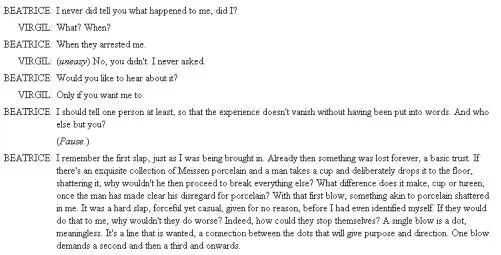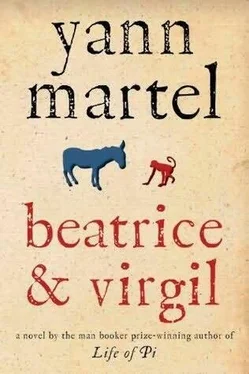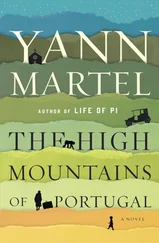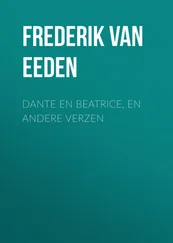Yann Martel - Beatrice and Virgil
Здесь есть возможность читать онлайн «Yann Martel - Beatrice and Virgil» весь текст электронной книги совершенно бесплатно (целиком полную версию без сокращений). В некоторых случаях можно слушать аудио, скачать через торрент в формате fb2 и присутствует краткое содержание. Жанр: Современная проза, на английском языке. Описание произведения, (предисловие) а так же отзывы посетителей доступны на портале библиотеки ЛибКат.
- Название:Beatrice and Virgil
- Автор:
- Жанр:
- Год:неизвестен
- ISBN:нет данных
- Рейтинг книги:5 / 5. Голосов: 1
-
Избранное:Добавить в избранное
- Отзывы:
-
Ваша оценка:
- 100
- 1
- 2
- 3
- 4
- 5
Beatrice and Virgil: краткое содержание, описание и аннотация
Предлагаем к чтению аннотацию, описание, краткое содержание или предисловие (зависит от того, что написал сам автор книги «Beatrice and Virgil»). Если вы не нашли необходимую информацию о книге — напишите в комментариях, мы постараемся отыскать её.
A famous author receives a mysterious letter from a man who is a struggling writer but also turns out to be a taxidermist, an eccentric and fascinating character who does not kill animals but preserves them as they lived, with skill and dedication – among them a howler monkey named Virgil and a donkey named Beatrice…
Beatrice and Virgil — читать онлайн бесплатно полную книгу (весь текст) целиком
Ниже представлен текст книги, разбитый по страницам. Система сохранения места последней прочитанной страницы, позволяет с удобством читать онлайн бесплатно книгу «Beatrice and Virgil», без необходимости каждый раз заново искать на чём Вы остановились. Поставьте закладку, и сможете в любой момент перейти на страницу, на которой закончили чтение.
Интервал:
Закладка:
The very next day, unshaven, dishevelled, exhausted, looking like a homeless man, he returned to Okapi Taxidermy. He brought with him all he had of the taxidermist's play, which wasn't much, just the pear scene, the scene Henry had written describing Virgil's howl, and the scene the taxidermist had dropped off at the theatre, about the red cloth of suffering and the empty good cheer. Henry didn't know why he brought these along. Perhaps in his mind he meant to put everything on the table and start all over with the man.
As he approached the store, Henry thought about the taxidermist's note:
My story has no story.
It rests on the fact of murder.
The murder of whom?
The okapi surprised and delighted him as much as it had the first time. He opened the door to the store and heard the familiar tinkle of the bell. The marvellous cavern of animals opened up. Henry's throat constricted and tears welled in his eyes as he thought of Erasmus and Mendelssohn. It occurred to him that it had never crossed his mind to have them mounted. After a last look and a last hug, he had accepted the disappearance of their bodies.
The taxidermist appeared with his usual swiftness. He stood stock-still, looked hard at Henry, and then disappeared back into his workshop without saying a word. Henry stared in disbelief at the space where the taxidermist had been. He was no more than an acquaintance. True, they had discussed the taxidermist's creative effort, and discussed it at some length-but did that fact mean the elementary rules of good manners were suspended? Perhaps in the taxidermist's mind, having entered the intimacy of his play, Henry had become like family, to be treated with that gruffness we reserve for those to whom we are closest. Henry chose to take the taxidermist's behaviour in this light. Despite his tiredness, he was buoyed by his state as a new father, and he was softened by the thoughts he had just had about Erasmus and Mendelssohn. Henry was in no mood for friction. He took a deep breath and entered the workshop.
The taxidermist was at his desk, looking at his disorganized papers. Henry took his usual place on the stool.
"So what's your real name? What else are you hiding?" the taxidermist said gruffly, without looking up.
Henry answered softly. "My name is Henry L'Hote. I write under a pen name. I'm sorry I haven't come to see you in a while. I've been very busy. My son was born. And Erasmus, my dog, you remember? We had to put him down."
How odd, Henry thought, I'm apologizing for the birth of my son and the death of my dog. The taxidermist did not respond. Henry wondered if the man was angry or hurt. He couldn't tell. He had no right either way, Henry knew. He owed the taxidermist nothing. But he had been lucky as an artist and the taxidermist hadn't been. He was stewing over a play that didn't work, while Henry was a new father who happily lived off a novel that did. What would he gain by taking offence at an old man who was miserable?
Henry spoke again. "In your Horrors' sewing kit, you have '68 Nowolipki Street'. Where is that?"
"It's an imaginary address where every trace of the Horrors would be filed away and saved, every memoir, account and history, every photograph and film, every poem and novel, everything. They would all be found at 68 Nowolipki Street."
"And where is 68 Nowolipki Street?"
"In a corner of every mind and on a plaque in every city. It's a symbol, one of Beatrice's ideas."
"Why Nowolipki? Why that strange word?"
"Beatrice felt like crying and she thought, 'Now, oh lip, keep from trembling,' and she shortened it."
"And on Now-oh-lip-keep-from-trembling Street, why number 68?"
"No reason. Just a number I chose."
The taxidermist was being duplicitous. Nowolipki Street was-and is-a street in Warsaw, and 68 Nowolipki Street is the address at which, after the Second World War, ten metal containers and two milk cans were found stuffed with archival material. The material was varied, consisting of studies, testimonies, charts, photographs, drawings, watercolours and underground press clippings, in addition to official documents such as decrees, posters, food rationing cards, identity papers and so on. This vast documentation proved to be a chronicle of every aspect of life and programmed death in the Warsaw Ghetto from 1940 until its elimination in 1943 after the Ghetto Uprising. The material was brought together by a collective of historians, economists, doctors, scientists, rabbis, social workers and others under the leadership of the historian Emmanuel Ringelblum. The group gave itself the code name Oneg Shabbat, which means "Joy of the Sabbath" in Hebrew, because they usually met on Saturdays. The great majority of them perished in the Ghetto or in the aftermath of its destruction.
It was in remembering that address and those desperate time capsules that Henry knew for certain what the taxidermist was doing. Here was irrefutable proof that he was using the Holocaust to speak of the extermination of animal life. Doomed creatures that could not speak for themselves were being given the voice of a most articulate people who had been similarly doomed. He was seeing the tragic fate of animals through the tragic fate of Jews. The Holocaust as allegory. Hence, Virgil's and Beatrice's incessant hunger and fear, their inability to decide where to go or what to do. And when Henry remembered the drawing the taxidermist had shown him with the Horrors hand gesture, it was not what Virgil did with his fingers once his hand was right in front of his chest that struck Henry now-it was the initial position of the arm: something very close to a Hitler salute, wasn't it?
Fate had brought Henry into contact with a writer-well, a struggling writer-who was doing exactly what Henry had argued should be done in his rejected book three years earlier: he was representing the Holocaust differently.
"Why don't you read me another scene from your play? Let's start that way," Henry said.
The taxidermist nodded without saying a word. He found a handful of papers and cleared his throat. In his measured voice he started:

I was walked down a corridor. I thought I was being brought to a cell. All the doors giving onto it were closed, except for one, which cast a trapezoid of light upon the floor. "Here it comes," a young man at my side said in an offhand tone, as if we were waiting for a bus. He had already taken his jacket off and was rolling up his sleeves. He was a tall, raw-boned man. With him were two other men. They followed his orders. I was brought into a plain, brightly lit room with a bathtub at its centre. The tub was full of water. Without any ado, they pushed me up to it, my body perpendicular to its edge, and they brought me to my knees. They forced my head underwater and kept it there. They didn't have an easy time of it, though. My neck is strong and it was taking all three of them to hold my head down, especially as I kept shoving them aside with my shoulders.
They found a solution: they stood me up, tied my front legs together, tied my back legs together, brought me alongside the bathtub, and pushed me over sideways into it. My legs went flying and I landed on my back with a splash, hitting my head against the tub's edge. They filled the tub with more water. The water was cold, but I soon forgot about that. I struggled, only now they had it easy. One man held my back legs in the air, another held my front legs, and the third was free to push my head back into the water. To be drowning standing up, solid on your four legs, your head set as if you were drinking, is one thing. It's simple drowning, horrible, but at least respectful of your sense of gravity and suited to how your head likes to be positioned. You have a degree of control over when you breathe in the water. But to be on your back, a palm pushing against your jaw, forcing your head backwards into the water, now the water invades your nose right away and you instantly feel you're drowning. Your neck is killing you because you're desperately trying to tilt your head forward. Each time you try to swallow, it's like a knife is piercing your throat. The panic, the terror of it-I had never known anything like it.
Читать дальшеИнтервал:
Закладка:
Похожие книги на «Beatrice and Virgil»
Представляем Вашему вниманию похожие книги на «Beatrice and Virgil» списком для выбора. Мы отобрали схожую по названию и смыслу литературу в надежде предоставить читателям больше вариантов отыскать новые, интересные, ещё непрочитанные произведения.
Обсуждение, отзывы о книге «Beatrice and Virgil» и просто собственные мнения читателей. Оставьте ваши комментарии, напишите, что Вы думаете о произведении, его смысле или главных героях. Укажите что конкретно понравилось, а что нет, и почему Вы так считаете.












